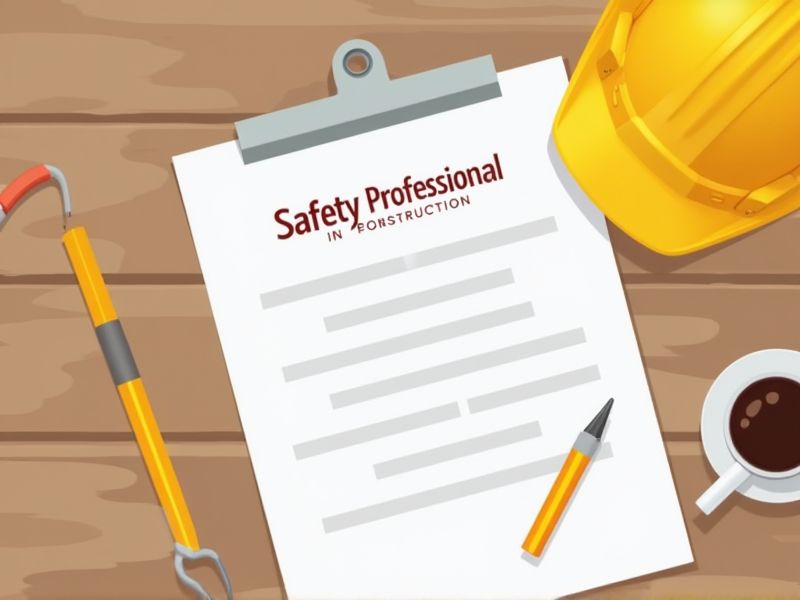
The construction industry faces numerous hazards that can lead to serious injuries or even fatalities, making safety a critical concern. Safety professionals must possess in-depth knowledge to identify, evaluate, and mitigate risks effectively within construction sites. Certifications provide formal recognition of this expertise, ensuring safety officers are equipped with up-to-date practices and legal compliance standards. Several crucial certifications are necessary for a Safety Professional in Construction, ensuring the highest standards of workplace safety.
Certified Safety Professional (CSP)
Construction sites present high-risk environments, making advanced safety expertise crucial, which CSP certification provides. The CSP credential signifies a professional who possesses comprehensive knowledge in safety management and risk assessment. This recognition can lead to improved safety measures, thereby reducing accident rates and associated costs on construction projects. Employers often prioritize CSP-certified professionals, expecting enhanced compliance with safety regulations and standards.
Construction Health and Safety Technician (CHST)
A Construction Health and Safety Technician (CHST) is essential because they provide expertise in identifying and mitigating workplace hazards specific to construction environments. Their presence helps in reducing accident rates, thereby minimizing injuries and fatalities on site. They ensure compliance with occupational safety regulations and standards, which protects the company from legal liabilities and potential fines. Through continuous risk assessments and safety audits, CHSTs contribute to the overall safety culture, leading to increased productivity and morale among workers.
Associate Safety Professional (ASP)
Construction sites are inherently risky environments, so an Associate Safety Professional (ASP) credential helps ensure that professionals are equipped with expert knowledge to mitigate hazards. Certification validates a safety professional's proficiency in identifying and controlling workplace risks, thus reducing the likelihood of accidents. Possession of the ASP credential often leads to an improved safety culture on site, which can result in fewer injuries and legal liabilities. The presence of certified safety professionals enhances the company's reputation, attracting more business opportunities and partnerships.
OSHA 30-Hour Construction Safety Training
OSHA 30-Hour Construction Safety Training provides comprehensive knowledge on occupational safety standards, crucial for professionals to mitigate workplace hazards effectively. Construction sites exhibit high-risk environments; such training equips individuals to recognize and prevent potential incidents. Through an understanding of OSHA regulations, safety professionals can ensure compliance, minimizing the likelihood of legal and financial repercussions. This training fosters a culture of safety, enhancing overall productivity and workforce morale.
OSHA 10-Hour Construction Outreach Training
The OSHA 10-Hour Construction Outreach Training provides fundamental safety knowledge, directly influencing a professional's ability to identify and mitigate common hazards on construction sites. The training enhances a safety professional's understanding of OSHA regulations, which directly affects compliance and reduces the likelihood of legal penalties. Completion of the course results in a universally recognized certification, contributing to a safety professional's credibility and employability in the construction industry. Widespread adoption among contractors demonstrates the course's role in fostering a culture of safety, directly impacting workplace accident rates.
NEBOSH Construction Certificate
The NEBOSH Construction Certificate is essential for safety professionals because it equips them with a comprehensive understanding of health and safety regulations specific to the construction industry. Possessing this certificate demonstrates a professional's capability to identify and manage construction-related hazards effectively. In an industry where safety regulations are stringent and constantly evolving, the certificate ensures professionals are updated on best practices and current legal standards. The qualification often enhances employability and career advancement prospects due to its recognition as a benchmark of expertise in construction safety.
HAZWOPER Certification
HAZWOPER Certification is crucial for safety professionals in construction due to its comprehensive training on handling hazardous substances, reducing the risk of harm on-site. The certification ensures that safety personnel are well-prepared for emergency response and containment, which is critical in minimizing incidents. Regulatory compliance requires trained individuals to manage hazardous materials, and having certified professionals keeps construction projects in line with standards. Employers often look for this certification as a benchmark for ensuring workers' safety and maintaining workplace safety standards.
First Aid/CPR/AED Certification
Safety professionals in construction often encounter hazardous situations, and First Aid/CPR/AED certification equips them with the skills to respond effectively to onsite medical emergencies. The construction environment presents risks of injuries such as falls or electrical shocks, making immediate medical attention critical to minimize harm. Proper certification ensures compliance with safety regulations, contributing to a safer workplace and reducing liability for companies. Equipped with life-saving skills, certified professionals can improve the overall safety culture on construction sites.
Certified Industrial Hygienist (CIH)
Certified Industrial Hygienists (CIHs) are needed in construction because they possess specialized knowledge in assessing workplace health hazards, such as exposure to harmful chemicals, which directly impacts worker safety. The expertise of CIHs assists in developing comprehensive risk management strategies, mitigating potential accidents, and health issues on-site. Their proficiency in regulatory compliance ensures that construction companies adhere to occupational safety standards, avoiding legal repercussions. Integrating CIHs into safety management teams enhances overall site safety culture by systematically identifying and controlling occupational hazards.
Lean Six Sigma Green Belt Certification
Lean Six Sigma Green Belt Certification equips safety professionals with tools to identify inefficiencies, directly impacting construction project timelines and costs. Understanding lean principles enables the integration of waste reduction strategies, improving workflow in construction safety protocols. Green Belt training enhances problem-solving skills, ensuring that safety issues are addressed swiftly and effectively. The certification fosters a culture of continuous improvement, critical for maintaining high safety standards in dynamic construction environments.
Summary
By obtaining certifications, you enhance your credibility and expertise in the construction industry. This recognition often leads to increased job opportunities and potentially higher salaries. Organizations may also experience improved safety standards and reduced workplace incidents, attributing to your certified skills. Consequently, your role becomes pivotal in fostering a safer working environment on construction sites.
